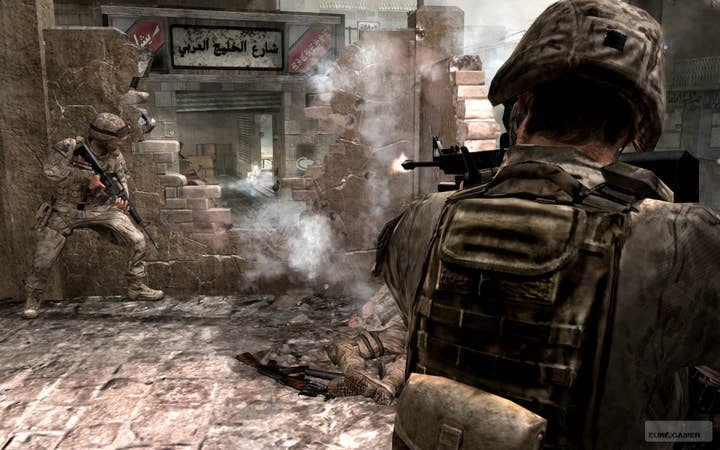Internal Warfare
The mainstream press doesn't care for any "controversy" in this year's Call of Duty; so why are gamers themselves so riled about it?
The launch of a new Call of Duty game has been cemented into the industry's calendar as the focal point of the pre-Christmas season. So significant are the launch weekend sales of Activision's pillar franchise that they have come to be seen as a barometer for the health of the games business as a whole - not a fair or accurate assessment to make, but one which is simply too tempting for the mainstream media to drop.
As such, the reporting of the launch of Modern Warfare 3 has focused heavily on sales of the game - which have been stellar, outstripping the launch sales of its predecessor and promising to become one of the biggest drivers of entertainment retail sales in the weeks leading up to Christmas. It's tempting to roll our eyes a little as the mainstream press once again breathlessly reports the long-established fact that rather a lot of people play video games now, but it doesn't exactly do any harm to have it reaffirmed in headlines.
There's always a secondary story to accompany the launch of a Call of Duty game, though - one which often bubbles away in the background long after the headlines about sales figures and pictures of Z-list celebrities at launch parties have faded from media consciousness. Call of Duty is a game about war, terrorism and shooting a whole lot of people; it's always accompanied by some kind of controversy.
The harshest critics of No Russian were not those outside games, they were those within games.
That peaked, of course, with No Russian - the now infamous level in Modern Warfare 2 which placed the player, as a covert operative infiltrating a terrorist group, at the heart of an attack on civilians in an airport. I suspect that No Russian may eventually be remembered as the last great moral outrage against video games; even at that, the reaction it provoked was very tame compared to the panics of previous years. Outside of the deeply socially conservative "usual suspects", most media outlets ran the story at low prominence and gave plenty of voice to supportive viewpoints as well as outraged rent-a-quotes.
This year's iteration of the franchise sees terrorist attacks and running battles extended across various famous cities around the world (including London), arguably extending the potential for controversy even further. As if on schedule, a video which was tagged as being the touchpaper for this year's firestorm of controversy appeared on the Internet a few days prior to the launch of the game - a cutscene showing a terrorist attack on Westminster through the perspective of a tourist's video of his wife and child being caught in the blast.
Reaction to the video from gamers and more specifically from specialist game writers and commentators was instant and visceral. Few seemed willing to defend the inclusion of the scene - plenty were ready to condemn it as being a cynical and exploitative attempt to build publicity for the game by courting controversy. The prevailing attitude can be summed up as simply "oh, here we go again" - a reflexive battening down of the hatches ahead of yet another battering from the socially conservative wing of the press.
Unbatten the hatches and fold the storm shutters away. Poke your heads out of your bomb shelters and look around - there's no controversy. Nobody outside the games business itself actually cares, or is particularly shocked or horrified. In fact, coverage of the launch of Modern Warfare 3 in London's city newspapers (the morning's Metro and evening's Evening Standard) did mention that the city's tube network and landmarks feature in the game - but the tone was distinctly more "hey, it's got our city in it!" rather than "sick game brings horror to London's streets". It's worth noting in this context that Metro in particular isn't exactly a pillar of the liberal press, being a freesheet which belongs to the same stable as the notorious Daily Mail, from which it draws most of its editorial focus.

In short, the response of gamers and gaming insiders to this "controversial" scene has been significantly more reactionary than that of the mainstream press. This seems ridiculous, but it's a situation which has actually been building for some time. In recent years, a peculiar transition has taken place - from a knee-jerk defence of everything violent which the industry did, even when it was in pretty poor taste, to a knee-jerk accusation of cynical exploitation in the same circumstance. (It's worth noting, though, that there's still a strong knee-jerk defence response at work too - it's just that now it's applied to issues of race and gender rather than violent content.)
The harshest critics of No Russian were not those outside games, they were those within games, and the same has been broadly true of every other controversy around violent content in the past few years. There's a peculiar psychology to this; perhaps the reaction is best explained as being natural for people who are tired of defending their hobby or their livelihood to friends and relatives, and who feel that scenes like this undermine their arguments. It's a reaction divorced from the reality of broader media, where much more violent content is routinely used as a scene-setting device in movies or TV shows that are every bit as dumb and exploitative as the most daft action game, without raising an eyebrow from the mainstream press.








